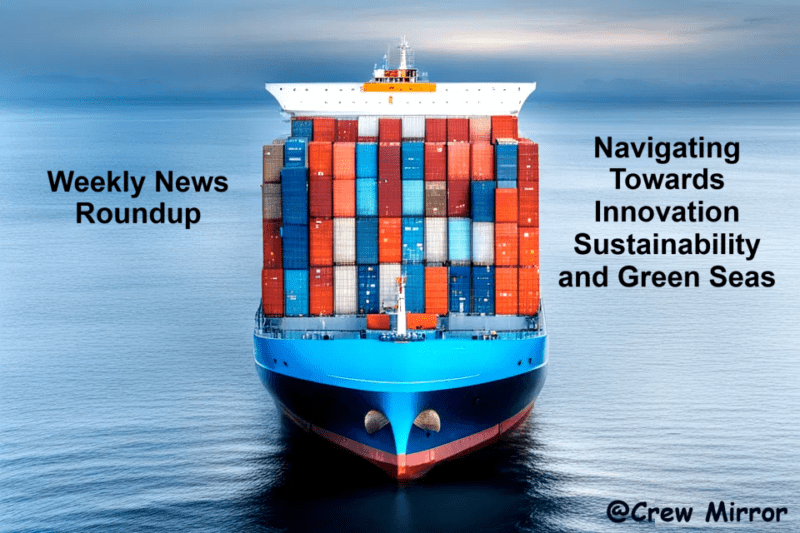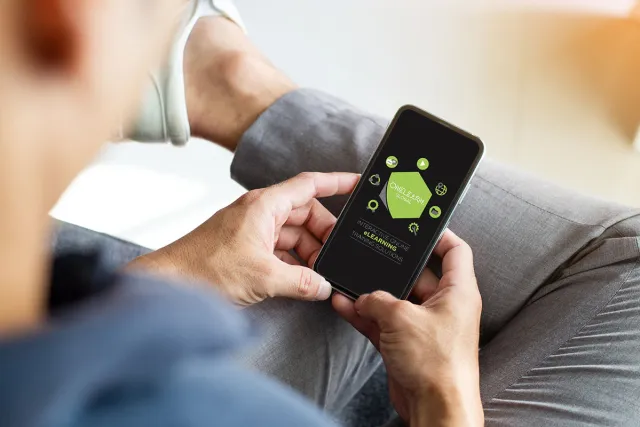24 July
1. Industry firsts: Berge Bulk ship tests solar panels
24 July : Bulker owner and operator Berge Bulk has launched a pilot test to trial the maritime application of solar technology.

The test is being carried out on Berge K2, the company’s 262,600 dwt Capesize ore carrier. The solar panels convert light from the sun into electricity. Onboard ships, these devices can be used to supplement the diesel generators and reduce the power required from these units. Berge Bulk has become one of the few shipping companies to test this technology, given that solar panels on ships are not very common at present.
2. Seafarer welfare overhaul needed to meet new challenges
24 July : Action needs to be taken now to improve seafarer welfare provision and prepare for the changing welfare needs of crews come 2050, according to a research report.

The report titled A Fair Future for Seafarers? was produced by Thetius and commissioned by Inmarsat to assess the challenges seafarers may face by 2050 and any steps the industry can take to best support seafarers in a changing market.
The report said that the maritime industry will undergo a technological change over the next few decades similar to that seen in other industries. “This includes levels of automation following a similar pattern to aviation. The number of people involved in operating a ship will likely reduce and the role of officers will move to monitoring an automated operation,” the report said.
Changes in operation may lead to two populations within the seafaring community, a small number of highly paid specialists and a larger number of lower-paid workers for routine maintenance.
The changed and challenging industry of 2050 will call for adaptations in the sector’s approach to training and welfare, said the report, as shorter port calls will limit access to welfare services ashore.
The report recommended the establishment of a global seafarer advocacy organisation to lobby for funding and better standards as well as to support individual seafarers.
n a similar vein, the report recommended a strategic review of local seafarer services. Crew welfare provision had developed over centuries by separate faiths, charities, organisations and international bodies, and a holistic look at provision levels around the world could lead to a more balanced provision which could reach more seafarers.
Finally the report suggested that due to the likely decrease in port welfare visits, development of digital services should be pursued while not neglecting the creation of seafarer support centres.
The full report is available on Inmarsat’s website here.
23 July
3. Solar-powered waste collection ship launched in Hamburg
23 July : Environmental organization One Earth – One Ocean (oeoo), with the support of building materials group Holcim Ltd., has launched the Circular Explorer, a purely solar-powered catamaran built to collect trash from the water.

The launching ceremony took place in Hamburg, Germany, on 21 July 2021. The innovative ship has been developed by oeoo and financed by Holcim.
“The Circular Explorer is our newest and most modern weapon in the fight against plastic waste. We are very grateful to CEO Jan Jenisch and his company Holcim for their support and look forward to working together to combat marine litter,” Günther Bonin, Founder of oeoo, commented.
Specifically, the newbuild represents an evolved version of the garbage collection ship Manatee, which is already in use and can extract 4,000 kg of plastic waste out of the sea per day.
Following the christening, the Circular Explorer will stay in the Baltic Sea until October to retrieve ghost nets off Fehmarn, according to oeoo.
In the coming year, it will be transported to the Bay of Manilla in the Philippines in order to fight plastic pollution there.
4. Ocean Technologies Group Helps Seafarers Minimise Onboard Distractions
 23 July : Ocean Technologies Group (OTG) has created a new title giving seafarers advice on how to avoid the multitude of potential distractions which can lead to a loss of concentration and situational awareness. The increased use of electronic devices onboard either personal or work related, a lack of procedures, seafarer stress and equipment alarm fatigue, are just some of the multiple factors that can contribute to crew not paying adequate attention to operational tasks.
23 July : Ocean Technologies Group (OTG) has created a new title giving seafarers advice on how to avoid the multitude of potential distractions which can lead to a loss of concentration and situational awareness. The increased use of electronic devices onboard either personal or work related, a lack of procedures, seafarer stress and equipment alarm fatigue, are just some of the multiple factors that can contribute to crew not paying adequate attention to operational tasks.
The guidance indicates that “someone using a mobile devices may miss up to 50% of other information that is in plain sight and might be critical.”
It is against this backdrop that Ocean Technologies Group has developed its eLearning title to help seafarers understand exactly what distraction is, recognize the link between distraction and a reduction in situational awareness, identify the common sources of distraction and learn how it can be effectively managed.
Further information on the comprehensive range of e-Learning courses provided by Ocean Technologies Group can be found on its website www.oceantg.com
22 July
5. Raising standards at sea
22 July : “What’s happening beyond our shores is a giant blank in the public debate, and a space where almost anything goes.” Green Peer Natalie Bennett outlines the ongoing debate surrounding human rights at sea.

Britain has a long maritime history, for good and ill. Great Yarmouth was one of the earliest record fishing centres of Europe, its fishers venturing as far as Iceland by the 14th century. From Tudor privateers in the Caribbean to 19th-century gunboat diplomacy, seagoing has been central to the UK’s place in the world, and a significant source of employment, whether voluntary or ‘pressed’.
What today’s maritime workers’ lives are like is hardly a topic of daily conversation. Covid saw many trapped in desperate conditions; that received a little attention. The occasional dreadful case of seafarers abandoned by vessel’s owners, like that of the MV Ali Bey, is highlighted by NGOs, but mostly what’s happening beyond our shores is a giant blank in the public debate, and a space where almost anything goes. This is a wild west with no sheriff in sight.
It is hard not to think that this is not just a question of ‘out of sight, out of mind’, but deliberate, careful ignorance. We bear a responsibility for what happens in the vessels that sail from or arrive at our shores, bringing the goods we depend on, whichever flag of convenience they fly. Ninety-six per cent of EU-owned vessels now fly flags of convenience, enabling their owners to dodge tax, ignore environmental and labour regulation, and, when vessels come to the end of their life, ensure they are scrapped as cheaply as possible in disastrous environmental conditions.
When we’re thinking about workers’ rights, about environmental standards, about the real costs of the way our society operates, we can no longer continue to ignore the 70 per cent of the earth’s surface that is water. Equal – or given the natural dangers, even greater – protections should apply, in rules on safety, workers’ conditions and environmental protections.
21 July
6. Shipping caught in self-made trap of delusions.
21 July : 19 crew of bulk Danish bulk carrier NORD COLUMBIA were declared to be test positive in Alicante, Spain. The ship arrived at Alicante on Jul 16 and is berthed, of course she has been put under quarantine, and while one of positive tested crew was taken to hospital, the rest remain on board, having as local sources put it, “mild symptoms”. The ship arrived from Oran Algeria, but prior to Oran, she called Tenerife. Bulk carrier SHOVELER meanwhile, is still “under quarantine” or whathaveyou, at Recife anchorage, Brazil, since early May. One of crew, 50-year old Filipino seaman, passed away in hospital on Jul 18, with eight remaining test positive.
Self-made trap
I don’t monitor and record all cases of mass test positive crews, it has become impossible and meaningless. There are too many of such cases, and information on each and every such case is glaring biased, incomplete and misleading. It’s all covid or delta variant. I’ve listened to a number of lectures and read studies, and found the difference between good old last year’s covid, and this new scarecrow, delta variant. Delta variant is a much bigger fake and fraud, than initial one. What we have now, specifically on board of ships, is the consequences of criminal mass crew vaccination campaign. We don’t have statistics (secret); full data on vaxx numbers and consequences (secret) – we’re blind, essentially. We don’t know and can’t even roughly estimate devastating effect of mass vaccination. We remain in delusional information bubble, concocted and sustained by ministries of truth (health agencies; maritime organizations; trade unionists; most despicable and disgusting CEOs, etc), and by fake media.
Crews are pigeons in shooting range
I wonder what shipowners and managers are going to do next, when they finally, get a full blow of mass vaccinations ramifications. Crews are suffering from vaxx, falling ill and dying here and there, more and more often. Ships are put under quarantine. Skilled sea labor is soon to be a severe deficit, because many skilled seamen, lured by skyrocketing salaries, agree to vaxx, or actively looking for jabs, in order to get vaxxed status and sign on. They’re doomed, sentenced to – in best scenario – “mild symptoms” and positive testing. The more people get the poisonous jab, the more severe is the “new wave” of ever new “covid variant”. It’s not variants – listen to what science says – it’s “vaccines”.
So, the crews will be wiped out like pigeons in shooting range, with ships getting caught «in quarantine”, more and more often. Ask yourselves, shipping managers, for how long will you be able to stand the storm, how soon you’ll get bankrupt.
It doesn’t matter if you delude yourself with MSM narrative, reality will hit you
It’s very simple: you can’t physically live and work and survive in delusional, fake information bubble, concocted by mainstream narrative and agenda, and supplemented by your lack of courage to recognize the truth and accept reality. Reality will hit you.
More about this article: read here
7. AFCFTA prosperity requires more African seafarers, ships and ports.
21 July : Trading under the African Continental Free Trade Area (AfCFTA) agreement started on 1 January 2021, a significant milestone for Africa’s political and economic aspirations.

The deal created an enormous single market, uniting 1.2 billion people across 54 states with a combined GDP of US$3.4 trillion. The standard expectation would be that AfCFTA trading – taking place on a continent of few islands and many landlocked states – would happen mostly by rail, road or plane. In fact, the first goods traded under the AfCFTA regime were carried by ship from a Ghanaian cosmetics company to Guinea on 4 January. AfCFTA interconnectedness is needed to drive economic growth and development across the continent in the coming years. Africa’s maritime industries and actors will be vital in achieving this outcome, as sea transport offers the cheapest and fastest way of moving the largest quantity of goods across long distances.
20 July
8. Wind-Assisted Ship Propulsion Can Transform Marine Transport
20 July : Blue Wasp is an engineering consultancy specializing in wind-assisted ship propulsion that offers independent technical advice to support the decision making of stakeholders across the shipping industry.

Growing out of 10-year research experience specific to the topic at TUDelft (in The Netherlands), the company helps realize the unique economic and environmental benefits that wind assistance delivers. Giovanni Bordogna holds a PhD on the Aerodynamics of wind assisted ships from TUDelft. He is a goal-oriented engineer with a strong passion for green technology and entrepreneurship.
9. UK: Photographers invited to capture maritime scenes
20 July : National maritime charity, the Shipwrecked Mariners’ Society, is urging photographers of all abilities to submit images that capture the UK’s unique relationship with the sea – including its merchant ships, fishermen, coasts, harbours and ports.

The winning snapper will receive a £500 photographic equipment voucher.
10. The Persistence of Piracy and Armed Robbery against Ships in SOMS
20 July : The piracy and armed robbery (PAR) situation in the Straits of Malacca and Singapore (SOMS) was reportedly under control from 2017 to 2018. The Regional Cooperation Agreement on Combating Piracy and Armed Robbery against Ships in Asia (ReCAAP) Information Sharing Centre (ISC) recorded eight cases in 2018 compared to nine cases in 2017.[i] ReCAAP ISC attributed the improvement to the counter-piracy measures by the shipping industry and law enforcement agencies. Similarly, the International Maritime Bureau (IMB), in its 2018 annual report, cited the same measures to explain the improvement in SOMS
19 July
11. In India: A self-reliant DCIL will be ready to meet goals of Maritime Vision-2030
19 July : After Visakhapatnam Port Trust (VPT)-led consortium comprising four major ports picking up 73.47 per cent (Rs1,056cr) of GoI in Visakhapatnam-headquartered Dredging Corporation of India Ltd (DCIL), DCIL is showing good results.

DCIL embarked on an ambitious plan to remain globally-competitive by laying emphasis on quality and adhering to delivery schedule. Prof George Yesu Vedha Victor, Managing Director of the company, has rich experience in Indian marine and dredging industry. A commissioned officer of the sixth batch of All India Dredging Cadre, a C-suite executive, he has earned recognition in marine, ports and dredging sector. In an exclusive interview to Bizz Buzz, Prof Victor said notwithstanding the challenging environment, DCIL is poised to have a bright future ahead by becoming self-reliant to meet the goals of Maritime Vision 2030.
References :-
3) www.hellenicshippingnews.com





